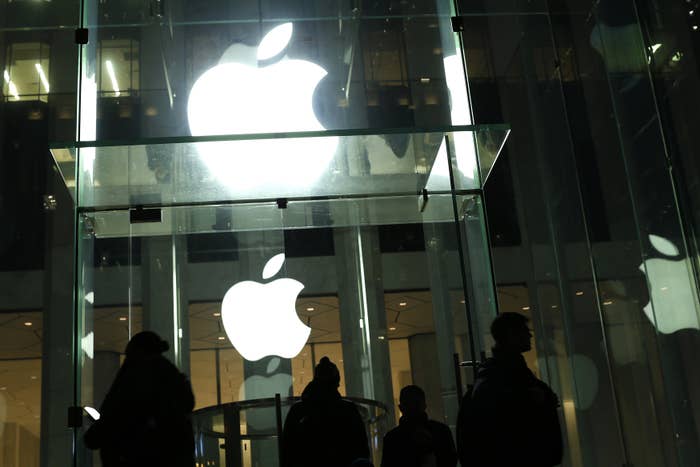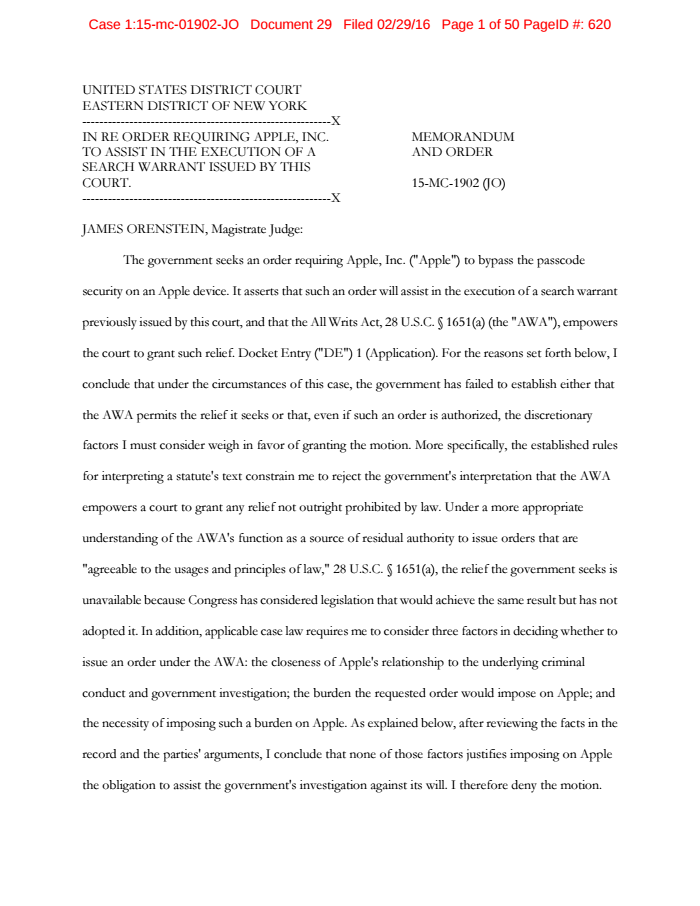
While Apple and the FBI battle in court over an encrypted iPhone in San Bernardino, another judge across the country has dealt a significant blow to the government’s case there.
U.S. Magistrate Judge James Orenstein of the Eastern District of New York denied the government’s request to compel Apple to assist law enforcement in extracting encrypted information from a suspect’s iPhone in a drug-related case. As in the San Bernardino case, the federal government invoked the All Writs Act of 1789 (AWA) in New York — asking the court to force Apple to help federal law enforcement pull information from a locked iPhone.
Orenstein rejected the request on multiple grounds — although Attorney General Loretta Lynch has said the Justice Department will be seeking further review of his order.
The order came a day before the House Judiciary Committee has scheduled hearings on encryption that will include testimony from both Apple and FBI officials.
First, Orenstein found that the AWA did not allow for the order sought by the federal government because the order would not be "agreeable to the usages and principles of law" — a requirement of the law.
The government argued that the absence of a specific law addressing the type of data in the circumstances here meant that the AWA could, in effect, be used as a "gap filler" where there was no specific law. Orenstein disagreed, concluding that "a comprehensive legislative scheme" is at play in this area of law and Congress chose not to require an entity like Apple to "provide the assistance sought here." Even if the AWA could be viewed as a "gap filler," in other words, it would not allow an order in this case because there is legislation covering the area — it just doesn't allow for the order the government wants.
Additionally, Orenstein considered discretionary factors considered by courts in granting requests under the AWA. In doing so, he weighed Apple’s relationship to the government’s investigation, the burden imposed by the government’s request, and the necessity of imposing that burden. After reviewing the facts and arguments, Orenstein found that "none of those factors justifies imposing on Apple the obligation to assist the government's investigation against its will."
Orenstein concluded that the novel questions surrounding the AWA, encryption, and government intrusion are best resolved by Congress, rather than the courts. "It would betray our constitutional heritage and our people's claim to democratic governance for a judge to pretend that our Founders already had that debate, and ended it, in 1789."
Attorney General Lynch expressed her frustration with Orenstein's decision, saying in a statement: “We are disappointed in the Magistrate’s ruling and plan to ask the District Judge to review the matter in the coming days. This phone may contain evidence that will assist us in an active criminal investigation and we will continue to use the judicial system in our attempt to obtain it."
While Orenstein’s decision does not bind the judge in San Bernardino, senior Apple executives said the New York ruling speaks directly to the California case.
In the New York case, the device in question runs on iOS 7, which enables Apple to pull information from the phone onto a separate hard drive — all without having to unlock it. The San Bernardino case, the Apple executives stressed, asks the company to do much more. The iPhone in California runs on iOS 9, an advanced operating system that no longer allows Apple to extract data from devices when they are locked. To gain access to the data held inside of the San Bernardino iPhone, the government has asked Apple to design new software that would disable and bypass several security features, something the company insists it has never been asked to do and has never done before.
In a call with reporters Monday night, the executives said the two cases are predicated on the same arguments offered by the government, and they viewed Orenstein’s decision as a possible prelude to a favorable ruling in San Bernardino.
BuzzFeed legal editor Chris Geidner contributed to this report.

